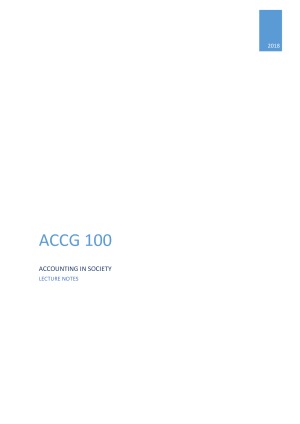HD ACCG100 SUMMARY NOTES FULL SEMESTER
Subject notes for Macq. ACCG1000
Description
Everything you need to know to ace accg100, includes worked examples and diagrams: WEEK 1: ACCOUNTING, ACCOUNTABILITY AND SOCIETY 4 Importance 4 Role and requirements 4 Types of Accounting 4 Management 4 Financial 4 Types of businesses 4 Sole proprietorship 4 Partnership 4 Company 4 WEEK 2: ETHICS 5 Ethics vs morals 5 Ethical theories 5 Teleological/Consequential ethics 5 Deontological/Non-Consequential ethics 5 The Accounting Code of Ethics 5 Ethical requirements on independence 6 WEEK 3: FINANCIAL ACCOUNTING FOR BUSINESS: ACCOUNTING CYCLE AND DOUBLE ENTRY METHOD 7 Accounting Cycle 7 Type of transactions 7 External transactions 7 Internal transactions 7 Non-Transactional Events 7 Five Financial Elements 7 1. A 7 2. L 7 3. O 7 4. R 7 5. E 8 Debit and Credit rules 8 Double-Entry Accounting 8 WEEK 4: FINANCIAL ACCOUNTING FOR BUSINESS: RECORDING TRANSACTIONS 9 T-Accounts 9 Trial Balance 9 WEEK 5: FINANCIAL ACCOUNTING FOR BUSINESS: ADJUSTING ENTRIES & ADJUSTED TRIAL BALANCE 9 Accrual Accounting 9 Accrual Basis Assumption 9 Most common use of accrual-based accounting 9 Cash-based accounting 9 Why do we need Adjusting Entries? 9 Classification of adjusting entries 9 Deferrals 10 Prepaid Expenses: 10 Unearned Revenue: 10 Accruals 10 Accrued Expenses: 10 Accrued Revenue 10 What is next? 10 WEEK 6: FINANICAL ACCOUNTING FOR BUSINESS: CLOSING ENTRIES 11 Temporary and Permanent Accounts 11 Closing Entries 11 Step 1 11 Step 2 11 Step 3 11 Step 4 12 The End Result 12 WEEK 7: FINANCIAL ACCOUNTING FOR BUSINESS: PREPARING FINANCIAL STATEMENTS 13 Users of Accounting Information 13 Internal User 13 External User 13 Information 13 1. Financial performance 13 2. Financial position 13 3. Cash movements 13 Income Statement 13 Balance Sheet 13 Statements of Changes in Equity 14 Accounting Assumptions 14 Accounting Entity Assumption 14 Accrual Basis Assumption 14 Going Concern Assumption 14 Period Assumption 14 Qualitative Characteristics 14 Relevance 14 Faithful Representation 14 Comparability and Consistency 14 Understandable 14 Materiality 14 WEEK 8: FINANCIAL ACCOUNTNG FOR BUSINESS: FINANCIAL STATEMENTS 15 Ratios 15 Ratio Analysis 15 Profitability ratios 15 Liquidity ratios 15 Solvency ratios 15 WEEK 9: INTRODUCTION TO MANAGEMENT ACCOUNTING AND BUDGETING 16 What is management accounting? 16 Functions 16 Manufacturing costs 16 Terminology 16 Budgeting 16 WEEK 10: COST VOLUME PROFIT ANALYSIS 17 Variable and Fixed Costs 17 CVP Analysis 17 Contribution Margin 17 Break-Even Point 18 Margin of Safety 18 Target Profit 18 WEEK 11: SUSTAINABILITY 19 Limitations of traditional accounting 19 Environmental accounting 19 Social accounting 19 Benefits of the triple bottom line for businesses 19 Stakeholders 20 Limitations 20
Macq.
Semester 2, 2018
20 pages
4,805 words
$29.00
2
